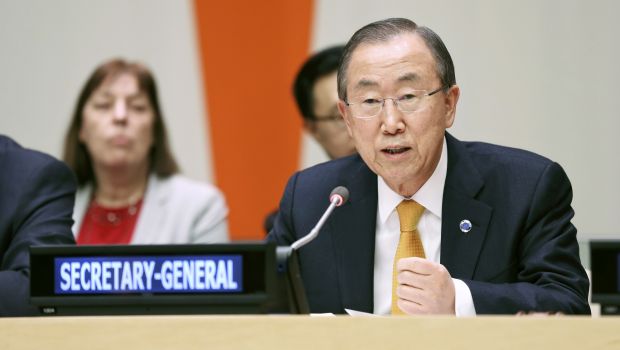
UN Secretary General Ban Ki-moon addresses the UN General Assembly with the results of the final report issued by the UN inspectors who examined seven alleged chemical weapons attacks in Syria, on Friday, December 13, 2013 at United Nations headquarters. (The United Nations, Ryan Brown)
United Nations, AP—Secretary-General Ban Ki-moon deplored the use of chemical weapons in Syria and demanded Friday that those responsible are held accountable.
Ban told the UN General Assembly that the international community also has a moral and political responsibility to deter further incidents and “ensure that chemical weapons can never re-emerge as an instrument of warfare.”
He addressed the 193-member world body on the final report issued Thursday by UN inspectors who examined seven alleged chemical weapons attacks in Syria. They concluded that chemical weapons were probably used in four locations, in addition to the confirmed attack near Damascus in August that forced the government to abandon its secret chemical stockpile.
The inspectors’ limited mandate authorized them to determine whether chemical weapons were used but barred them from identifying whether the government or opposition fighters were responsible for any of the attacks.
The opposition Syrian National Coalition in a statement blamed the attacks on the Assad regime and said the report should strengthen the world’s resolve to hold the Syrian government responsible.
“Evidence has now repeatedly demonstrated that the Assad regime has used chemical weapons against the Syrian people. Immediate action is therefore needed by the UN Security Council to refer Syria to the [International Criminal Court] and ensure that the perpetrators of these attacks are brought to justice,” said Dr. Najib Ghadbian, a representative of the group.
But Chief inspector Åke Sellström told a news conference that “more intrusive methods” than those authorized by the General Assembly for his investigation are needed to pinpoint the perpetrators of the attacks.
“I could speculate . . . but I don’t have information that will stand up in court,” he said.
Sellström said UN member states could authorize a new intrusive “forensic investigation” to determine responsibility, which would require more resources and the use of methods that his team couldn’t use. He didn’t elaborate.
UN disarmament chief Angela Kane told reporters there have been a number of calls for additional investigations to determine who was responsible for using chemical weapons.
A commission created by the UN Human Rights Council has already determined that both sides have committed heinous war crimes during the Syrian conflict. The Geneva-based commission is producing a confidential list of suspected criminals, which is kept under lock and key by UN High Commissioner for Human Rights Navi Pillay, and it is expected to eventually weigh in on who bears responsibility for the chemical weapons attacks.
The confirmed use of the deadly nerve agent sarin on Aug. 21 in the Ghouta area of Damascus, and the threat of possible US military action, led to a US–Russian agreement to eliminate Syria’s chemical weapons by mid-2014 and Syrian agreement to join the Chemical Weapons Convention. The process of getting Syrian chemicals that can be used to make weapons out of the country is currently under way.
Sellström said the inspectors were pleased that their initial finding on Ghouta led Syria to join the convention and agree to the elimination of its chemical weapons and precursors. Given its mandate, he rated the team’s performance at 8.7 on a scale of 1 to 10.
Thursday’s report said evidence indicated chemical weapons were also probably used in Khan Al-Assal outside Aleppo on March 19 against soldiers and civilians, Jobar in Damascus’ eastern suburbs on August 24 against soldiers, Saraqueb near Idlib in the northwest on April 29 against civilians, and Ashrafiah Sahnaya in the Damascus countryside on August 25 against soldiers. In two cases, it found “signatures of sarin.”
The government and opposition accused each other of using chemical weapons at Khan Al-Assal and the report said none of the parties in Syria denied their use in the village. The allegations of chemical weapons use at Jobar and Ashrafiah Sahnaya were made by the Syrian government, while Britain and France raised the allegations about Saraqueb.
Addressing the world’s diplomats, Ban said, “I deplore in the strongest possible terms the use of chemical weapons in Syria as an offense against the universal values of humankind.”
“Any use of chemical weapons by anyone under any circumstances is a grave violation” of the 1925 Geneva Protocol prohibiting the use of chemical and biological weapons “and other relevant rules of customary international law,” he said.
The secretary-general all countries to sign and ratify the Chemical Weapons Convention, which prohibits the development, production, acquisition, stockpiling, retention, transfer or use of chemical weapons. It has been ratified by 190 countries.
Israel and Myanmar have signed but not ratified the convention while Angola, North Korea, Egypt and South Sudan have neither signed nor ratified it.
As efforts continue to eliminate Syria’s chemical weapons and chemical precursors, Ban said he remains determined “to reach an urgent end to the conflict” which has killed “well over 100,000 people,” mostly by conventional weapons, and left nearly half of Syria’s population either displaced or in urgent need of humanitarian assistance.
Ban said the Syrian conflict, which began over two and a half years ago, is having “profound impacts on the stability and economy of the entire Middle East.”
